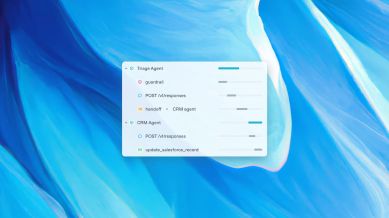OpenAI unveils new tools for building AI agents: Here’s what it means
The new tools enhance the OpenAI platform to allow developers and enterprises to build efficient agents.

OpenAI has announced an array of AI tools to help developers build reliable and useful agents. According to OpenAI, agents are systems that can independently perform various tasks on behalf of the user. The newly announced tools that are made using the company’s own AI models and frameworks are also aimed at helping businesses build AI agents.
While OpenAI has introduced a range of model capabilities in the last few years, the company claims that its customers shared that transforming these capabilities into production-ready agents has been fraught with challenges. To address these challenges, OpenAI has introduced a set of new APIs and tools that are designed to simplify the development of agentic applications. These new tools and capabilities include the Responses API, built-in tools such as web search, file search, and computer use; the Agents SDK; and observability tools.
Custom AI agents for businesses
One of the notable announcements has been the Responses API, which supports built-in tools such as web search, file search, and computer use. OpenAI said that these tools have been designed to work together to connect models to the real world, making them more useful in completing tasks. For businesses, the Responses API lets them build custom AI agents that can perform web searches, scan through scores of company documents, and scour through websites much like Operator Product.
“These tools are designed to work together to connect models to the real world, making them more useful in completing tasks. It also brings with it several usability improvements, including a unified item-based design, simpler polymorphism, intuitive streaming events, and SDK helpers like response.output_text to easily access the model’s text output,” the company said in its post. OpenAI has replaced its Assistants API with the new Responses API, and it has plans to phase out the former in the first half of 2026.
With web search built into the Responses API, developers can now get fast and up-to-date information with citations from the web. Web search is available as a tool when using GPT-4o and GPT-4o-mini and can be paired with other tools or function calls in the Responses API. Meanwhile, with File Search, developers can obtain relevant information from large volumes of documents using the improved file search tools. It comes with support for multiple file types, query optimisation, metadata filtering, and custom reranking.
OpenAI claims that File Search can offer fast and accurate search results. Moreover, developers using the responses API can also try OpenAI’s Computer-Using Agent (CUA) model that powers the operator. CUA can generate mouse and keyboard actions, allowing developers to automate computer use tasks such as app workflows and data entry. OpenAI has said that enterprises can run the CUA model, being released in research preview, locally on their own systems. However, the consumer version of the CUA available in Operator can only take actions on the web.
Agents SDK
On the other hand, the new open-source Agents SDK simplifies the development of multi-agent workflows and offers significant improvements. The improvements include making agents easily configurable LLMs with clear instructions and built-in tools; offering intelligent transfer control between agents; configurable safety checks for input and output validation; and the ability to visualise agent execution traces to debug and optimise performance.
With its latest announcements, OpenAI has signalled that agents will soon become integral to the workforce and will significantly boost productivity across industries. Earlier this year, in his blog post, CEO Sam Altman said that in 2025, the world may see the first AI agents, known for autonomously accomplishing tasks, join the workforce and materially change the output of companies’. In line with Altman’s vision, OpenAI is committed to providing the building blocks that allow developers and enterprises to create autonomous systems that deliver real-world impact.